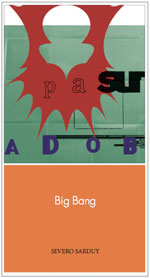
 Download PDF
Download PDF /ubu editions
/ubu editions
 ubuweb
ubuweb
Big Bang (1973)
Severo Sarduy
23 Pages
Cuban émigré Severo Sarduy (1937-1993) is one of the most daring and brilliant writers of the 20th century. By the publication of Big Bang, Sarduy had become director of the Latin American collection of Editions du Seuil, a regular contributor to the influential Tel Quel magazine, and an important theoretician of the neo-baroque. /ubu is excited to reintroduce this resplendent cosmological poetry cycle in the original bilingual version printed by Fata Morgana in 1973. Sarduy's interest in cosmology stems from a Foucauldian attention to shifts in the cosmological episteme made explicit by formal aspects of literature and the arts. Just as the development of the baroque ellipse was born of the confrontation of Kepler's elliptical orbit with Galileo's circular order in the 17th century, the modern theory of the expanding universe (in 1973, rooted in the discovery of the cosmic microwave background) introduces the polymorphic and movable center essential to modern literature. The theory of the empty center, the topology of the empty center, is going to reverberate in literature exactly as the theory of the ellipse resounded at a certain moment in the structure of the Gorgorine metaphor. Hijacking astronomical argot from "white dwarves" to "red giants," Big Bang explodes from this empty center with an elliptic circumscription of parodic pseudo-charts and de-functionalized cosmological notions. The unique arc of Sarduy's radial phenotext does not lead us to a pure and simple meaning, but rather, through a series of ellipses, of zig-zags, of détours, carries with it only a floating signifier—empty and polyvalent.